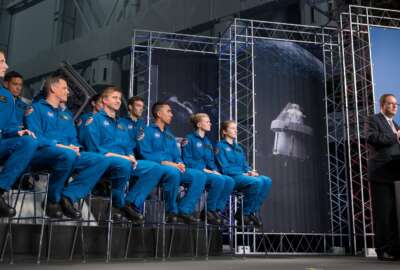
How small, simple acts lead to big changes on Best Places to Work rankings
The Homeland Security Department and Millennium Challenge Corporation, two vastly different agencies, offered similar lessons for success on the 2017 Best Places to...
Subscribe to Federal Drive’s daily audio interviews on iTunes or PodcastOne.
When sudden government shutdown planning and the crisis of the day take up the bulk of a federal manager’s work-week, it can be tough to focus in on the small things.
But agency leaders say it’s the small stuff that makes a big difference in the lives of their employees at the office.
“We need to think big, but we need to act small,” Homeland Security Department Deputy Secretary Elaine Duke said Friday morning at the Partnership for Public Service’s Best Places to Work awards breakfast. “Even on the busiest of days, we have time to say ‘Hi’ to someone we don’t know, we have time to shoot an email that thanks someone or ask someone a question.”
Duke accepted DHS’ award as the “most improved” large agency on the Partnership for Public Service and Deloitte’s annual “Best Places to Work in the Federal Government” rankings.
The Partnership and Deloitte analyzed Federal Employee Viewpoint Survey results for 410 agencies and subcomponents in 2017, the most of any other year.
DHS overcame six consecutive years of declining engagement scores and improved by 6.2 points in 2017, the second year in a row the department saw measurable progress.
“DHS has never been, to put it gently, at the top of these rankings, but we are working tirelessly to change that,” Duke said.
She spent last year touring DHS offices and subcomponents across the country to listen to employees’ concerns.
“Some of them were really small, and it was almost embarrassing that we hadn’t addressed them,” she said. “I went to one office where they weren’t allowed to have purchase cards because there was too much risk, but they had guns. … I saw that over and over again.”
Duke said it’s those small acts that can change how employees perceive their work environment and their leaders.
“Unfortunately, the bar is a little low,” she said. “I just yesterday had probably the most humbling experience of my return to federal service. I was meeting with our executive secretariat group, and an employee in the Q&A session thanked me for saying ‘Hi’ to him last week. That was amazingly uplifting knowing that everything we do is noticed. It was so humbling to know that that makes a difference, and that it must not be that common that someone noticed it.”
DHS also launched “Leadership Year” in fiscal 2018. Each quarter focuses on a different aspect of leadership, and it’s intended to help all employees improve their skills.
“We have found that with mission and the priorities, sometimes leadership gets left a little behind,” Duke said. “I have told my direct reports, if you’re not leading, you’re not doing your job. You could be the best subject matter expert, but that’s not your job anymore.”
Leadership at the Millennium Challenge Corporation, which earned the “most improved” small agency honor in 2017, also found success in simply setting aside time to talk with their employees about their goals.
“A lot of it just had to do with making the time to really have meaningful conversations around performance, around development,” Brandon Guzzone, the agency’s managing director for human resources, said in an interview with Federal News Radio. “Every federal agency is incredibly busy. We have a small, lean organization. But really finding a way to say, ‘Hey, look, we have to carve out that time in order to help people develop and grow.'”
The Millennium Challenge Corporation improved its ranking by 13.8 points in 2017 and now sits eighth among small agencies. Jonathan Nash, the agency’s acting chief executive officer, said he and his team took a “hard look” at the Federal Employee Viewpoint Survey results 18 months ago.
“It was really important as a leadership team to just listen and get all the issues out on the table, and then allow staff to prioritize which issues we should tackle,” he said. “When we got those messages from staff, we went about devising solutions with them in hand to address the problems.”
For the Federal Mediation and Conciliation Service, involving employees in key decisions is inherently part of the agency’s mission, and it’s the message it preaches to the private sector companies and federal agencies it works with every day.
“The principal focus is always for us on employee engagement, and that is trying to be as transparent as possible in what we’re doing and why we’re doing it, and allowing our employees actually to determine that and play an ongoing role,” Scot Beckenbaugh, FMCS deputy director, said in an interview. “Part of our mission is to teach others to do this, to be successful organizations. It’s quite appropriate that we would do it and be successful as an organization. We call it walking the talk.”
The agency moved to the number one spot among small agencies in 2017 and improved its score by 4.6 points.
Beckenbaugh said the Federal Mediation and Conciliation Service has also encouraged its employees to share their ideas. It’s message the agency takes the negotiating table at labor-management forums.
“We’re all stronger when we’re working together,” he said. “You need the diversity of opinion. Difference can be celebrated and it actually can be used to make us stronger, because you get new ideas and innovative ideas, and then you want to make sure you’re incorporating that as you move forward. The whole idea is that we don’t need to be opposed to each other on this stuff; we’re better off when we’re joined.”
Copyright © 2025 Federal News Network. All rights reserved. This website is not intended for users located within the European Economic Area.
Nicole Ogrysko is a reporter for Federal News Network focusing on the federal workforce and federal pay and benefits.
Follow @nogryskoWFED





